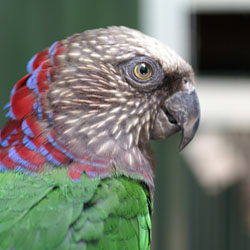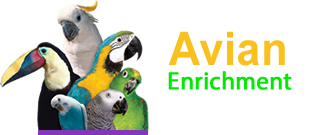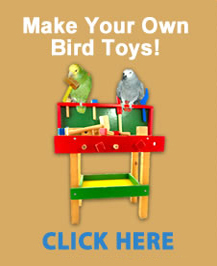Birdie 911 - Avian First Aid Basics
 If you have a sick or injured bird there are steps that you can take to help stabilize their condition until you can get them to an avian vet. DO NOT delay in taking action!
If you have a sick or injured bird there are steps that you can take to help stabilize their condition until you can get them to an avian vet. DO NOT delay in taking action!
Rule # 1 is to Be Prepared
By being prepared for an emergency, you can save your parrot's life. This requires:
- Having your avian vet's phone numbers (office and after hours) posted in a convenient location.
- Purchasing or assembling an Avian First Aid Kit.
- Knowing how to safely restrain your bird to prevent further injury or stress.
- Educating yourself on how to deal with basic emergencies.
- Having a heating pad, towel and carrier on hand to safely transport your bird.
In the Event of an Emergency:
- Stay calm as your bird is already very stressed.
- Gently restrain your bird.
- Assess the situation to see if it is something you can handle or if you need to stabilize your bird before transport to an avian veterinarian
- Take appropriate action.
- If your bird appears sick, stabilize your bird by:
- Keeping them warm in an incubator or a small, covered cage placed on a heating pad (set on low temp) or if necessary, a larger cage covered by an electric blanket. Heat is a must for sick birds and the recommended temperature range is 80 - 85°. It allows the bird’s bodily systems to work on fighting the infection rather than on maintaining its body heat.
- Encourage them to eat and drink
- Give them a chance to rest in a quiet, dark room. Sick birds not only need heat but up to 16 hours of restful sleep.
- If your bird is injured, take the appropriate level of action depending on the nature of the emergency (see below)
- Call your Avian Vet as soon as possible for further advice.
Safely Transporting Your Bird
When your bird is sick or injured he is already very stressed. It is important to have a safe, well designed carrier on hand for just this type of situation to keep your bird secure during the trip. During transport you must also keep your bird warm (hot water bottle or heating pad) to ward off shock and covered to keep your bird still and to minimize stress.
How to Deal With Common Emergencies
Note: This section provides only some basic steps to take in the event of a common emergency and is not intended to replace veterinarian care. When in doubt, always call your veterinarian for advice.
Bleeding Beak or Nail
-
- Gently restrain your bird.
- Apply pressure to the area using gauze or a paper towel.
- Apply styptic powder or cornstarch to coagulate the blood
- Watch bird closely over a short period of time to make sure that bleeding doesn’t reoccur.
- If bleeding continues for more than a few minutes call your avian vet.
Broken Blood Feather
-
- Gently restrain your bird.
- Using needle nose pliers or heavy duty tweezers carefully grab the feather shaft close to the skin and gently pull the feather out.
- Apply pressure to the empty feather follicle for 1-2 minutes using gauze or a cotton swab.
- Watch bird closely over a short period of time to make sure that bleeding doesn’t reoccur.
- If bleeding continues for more than a few minutes call your avian vet.
Skin wound
-
- Gently restrain your bird and apply immediate pressure to wound.
- If bleeding does not stop, use styptic powder. You can also use flour, cornstarch or baking powder if you do not have styptic powder.
- Once stopped, clean the wound with antiseptics like, betadine, hydrogen peroxide or chlorhexidine. Use a cotton swab or ball.
- Watch bird closely over a short period of time to make sure that bleeding doesn’t reoccur.
- Seek medical attention in case of continued bleeding or infection.
Animal bites or scratch
-
- Restrain your bird to keep it calm.
- Keep your bird warm.
- Take your parrot companion to veterinarian immediately as such an injury could cause bacterial infections leading to death within 24 hours.
Heat stroke
-
- Place feet in pan of cold water or mist feathers with cold water.
- Seek immediate medical attention.
Hypothermia
-
- Warm the bird by using a heating pad or place bird inside your clothes to capture your body heat. Be careful to not hold too tightly to interfere with breathing.
- Gently rub its feet to increase circulation or place them in warm water.
- Fill your bathroom with hot steam from the shower and hold your bird near.
- Seek immediate medical attention.
Burns
-
- Wash affected area with cold water.
- Dry the bird gently.
- Restrain bird and keep warm to avoid shock.
- Seek immediate medical attention.
Poisoning
-
- If poisoning is from a gas, remove the bird to a safe, well-ventilated area.
- If exposure is due to contact with a chemical, give your bird a bath.
- If exposure was through ingestion, contact your vet immediately with the name of the ingested chemical.
- Seek immediate medical attention.







Comments powered by CComment